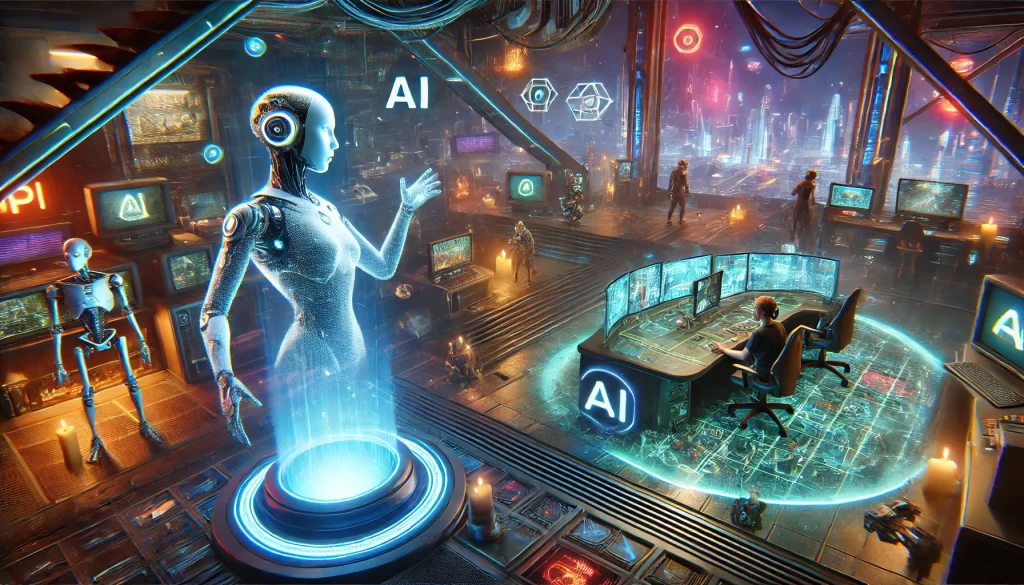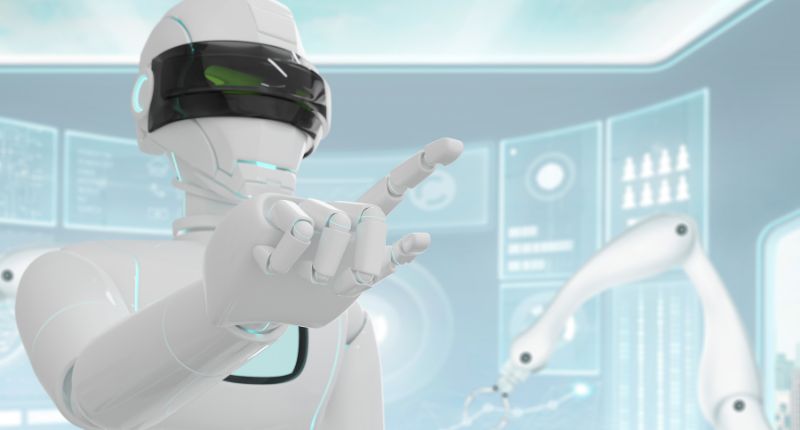How AI is Changing the Gaming Industry
Artificial Intelligence (AI) has become a game-changer in the gaming industry. From enhancing player experience to revolutionizing game development, AI’s impact is profound. In this article, we will explore how AI is changing the gaming industry, its role in game design, and what the future holds for AI-driven gaming.
The Role of AI in the Gaming Industry
1. Enhancing Non-Playable Characters (NPCs)
AI-powered NPCs have significantly improved gaming experiences. Earlier, NPCs followed pre-programmed paths with predictable behaviors. Today, AI-driven NPCs can learn, adapt, and react to players in real time.
For example, in games like Red Dead Redemption 2, NPCs remember past player interactions and respond accordingly, creating a more immersive world. AI-powered NPCs make games more challenging and realistic, keeping players engaged for longer periods.
2. Procedural Content Generation
Procedural content generation (PCG) allows developers to create vast and unique gaming worlds without manually designing every detail. AI algorithms generate landscapes, dungeons, missions, and even entire game levels dynamically.
Games like No Man’s Sky use AI-driven procedural generation to create an entire universe with over 18 quintillion planets. This ensures that every player experiences a unique world, enhancing replayability.
3. Realistic Game Physics and Animation
AI is helping developers create realistic physics and animations. Machine learning algorithms analyze motion patterns and generate lifelike character movements. This is particularly evident in sports and action games where players move naturally and react realistically to the environment.
For instance, FIFA games utilize AI to enhance player movements, making the game feel more like a real soccer match.
How AI is Transforming Game Development
1. AI-Generated Game Assets
Creating game assets like textures, characters, and environments is time-consuming. AI tools can now generate high-quality assets quickly, reducing development time and costs.
Companies like NVIDIA use AI to enhance graphics rendering through Deep Learning Super Sampling (DLSS), improving visual quality while optimizing performance.
2. AI in Quality Assurance and Bug Testing
Game testing is crucial for delivering a polished experience. AI-powered testing tools can analyze vast amounts of gameplay data, detecting bugs and performance issues more efficiently than manual testers.
AI-driven testing tools, such as Unity’s Game Simulation, can simulate thousands of playthroughs to identify potential issues before a game is released.
3. AI in Game Balancing
Balancing gameplay is a challenging task. AI can analyze player data and adjust game difficulty dynamically, ensuring an optimal challenge for each user. Adaptive AI, seen in games like Alien: Isolation, makes enemies smarter by learning from player behavior, keeping the gameplay unpredictable and exciting.
AI-Powered Player Experience
1. Personalized Gaming Experiences
AI collects and analyzes player data to create personalized gaming experiences. It adjusts difficulty levels, suggests in-game purchases, and recommends game content based on player preferences.
For example, Netflix’s Bandersnatch utilized AI to create a choice-driven experience, adapting the storyline based on user decisions.
2. AI-Powered Voice and Chatbots
AI-powered voice assistants and chatbots are making gaming interactions more intuitive. Voice recognition allows players to interact with characters using natural language, enhancing immersion.
Games like The Elder Scrolls V: Skyrim have experimented with AI-driven voice commands, allowing players to interact more naturally with the game world.
3. AI in Esports and Competitive Gaming
AI is revolutionizing competitive gaming by analyzing player performance and offering strategic insights. AI-driven coaching tools help professional gamers refine their skills and improve their gameplay strategies.
Platforms like DeepMind’s AlphaStar have demonstrated AI’s potential by competing against human players in complex strategy games like StarCraft II.
Challenges and Ethical Considerations of AI in Gaming
1. AI Bias and Fairness
AI algorithms can sometimes develop biases based on the data they are trained on. Ensuring fair and unbiased AI behavior is crucial for maintaining balanced gameplay.
2. Privacy Concerns
AI relies on collecting and analyzing player data. Developers must implement strict privacy policies to protect user information from unauthorized access.
3. Job Displacement in Game Development
As AI automates tasks in game development, concerns about job displacement arise. However, AI also creates new opportunities by enabling developers to focus on creativity rather than repetitive tasks.
The Future of AI in Gaming
The future of AI in gaming is promising. With advancements in machine learning, virtual reality (VR), and augmented reality (AR), AI will continue to shape the gaming landscape. Future AI-driven games will offer even more realistic graphics, smarter NPCs, and highly immersive experiences.
Resources:
For further insights, check out NVIDIA’s AI in Gaming to learn more about AI-powered game graphics and rendering.
Conclusion
AI is changing the gaming industry in ways we never imagined. From smarter NPCs to AI-driven game development, the impact of artificial intelligence is undeniable. As technology continues to evolve, AI will play an even bigger role in shaping the future of gaming.
By leveraging AI’s capabilities, developers can create more engaging, personalized, and immersive gaming experiences. The future of gaming is AI-driven, and we are only at the beginning of this exciting journey.


